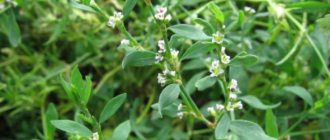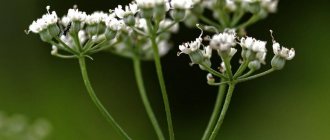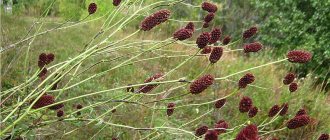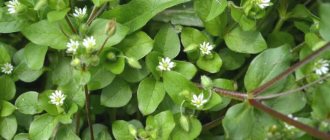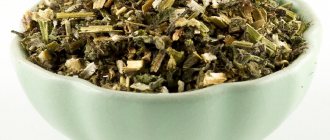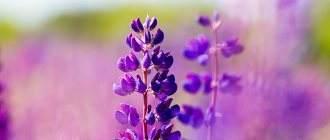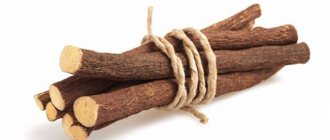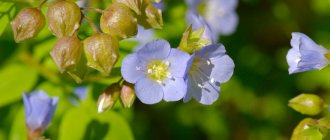Melissa is an essential oil plant from the Lamiaceae family. This modest-looking perennial herb has many names - honeywort, swarmer, beeworm, lemon balm, honey scent. It has been known to people since Ancient Greece. The natural scientist Theophrastus also described the plant in his botany studies. In the 16th century, lemon balm became famous as one of the components of the healing “water of the Carmelites,” which Alexandre Dumas mentioned in his work about Dartagnan.
The herb spread throughout the world from the Mediterranean and North Africa. Currently, the plant can be found in all parts of Europe, Central Asia, and America. Melissa is divided into 5 types, the most common of which is medicinal. This type of plant has 2 varieties: Quedlinburg creeping and Erfurt erect.
Cultivated lemon balm
Idaho Industrial Levy
Melissa can be found at the edge of the forest, in a ravine, or in a shady gorge. It is often planted in gardens, in beds near houses, on windowsills in apartments. The wide distribution of the plant is explained by the fact that it has attractive properties for humans - a pleasant aroma and the ability to treat diseases.
The first quality is often used to attract honey bees to the apiary and aromatherapy. The second property has made lemon balm a medicinal plant, popular in folk and official medicine. How is aromatic herb useful, how to treat it, and can it cause harm? These questions will be discussed below.
Medicinal and beneficial properties of lemon balm
The first recommendations for the use of lemon balm were given by Pliny the Elder. He wrote that it helps with women’s diseases, insect bites, and constipation. Avicenna considered the plant capable of driving away “dark thoughts” and melancholy. Modern works on the treatment of diseases also often mention lemon balm, the herb whose medicinal properties are described as follows:
- Eliminates nervous excitability and emotional stress.
- Relieves insomnia.
- Reduces blood pressure.
- Relieves headaches, migraines.
- Accelerates the elimination of fever during colds.
- Has an expectorant effect.
- Relieves muscle spasms and cramps.
- Strengthens the body's immune defense.
- Helps relieve seasonal allergy symptoms.
- Normalizes the functioning of the gastrointestinal tract, removes flatulence and constipation.
- Stimulates appetite.
- Helps eliminate menstrual irregularities.
- Relieves hot flashes during menopause.
- Activates the urinary tract.
- Produces an anti-inflammatory effect.
- Eliminates shortness of breath and heart pain.
- Helps activate reproductive function.
Contraindications and possible harm
When used for medicinal purposes, it is worth considering that lemon balm raw materials collected in environmentally polluted areas do not bring health benefits, but harm. However, even pure grass has contraindications:
- Allergy to plants of the Lamiaceae family. The most dangerous consequence of using lemon balm is angioedema, which threatens human life.
- Low pressure. The herb can aggravate the symptom and cause an adverse reaction in the form of tachycardia and confusion.
People whose activities involve increased concentration of attention should be wary of lemon balm. The plant has a sedative effect, which impairs the ability to concentrate.
What is lemon balm
Melissa officinalis is a plant that belongs to the Lamiaceae family; it reaches a height of more than 50 centimeters. This perennial herb has an erect branching with a tetrahedral stem, opposite petiolate, heart-shaped, ovate, coarsely toothed leaves covered with soft hairs. Small pale pink or white flowers are located on short stalks. The plant blooms in the 2nd year of life in mid-summer. The fruits of the grass are 4 brownish ovoid nuts. The Mediterranean region is considered to be the birthplace of lemon balm.
The flower spread across Europe from Ancient Rome, where it was grown several thousand years ago. In the homeland of lemon balm, the grass is considered a weed; it grows, as a rule, in grassy areas, open forests, in shady bushes, on river banks and along roadsides. Now lemon balm grows actively in Russia, Central Asia, Ukraine, the Caucasus, and Crimea.
Features of benefits for men and women
Because of its ability to positively influence the health of the fair sex, the plant is often called “women’s herb.” However, lemon balm is also useful for men.
Peculiarities of influence on ladies:
- Infertility treatment. The plant helps remove factors that prevent pregnancy: nervous tension, irregular menstruation, inflammation of the pelvic organs. Women are advised to take decoctions and apply compresses with lemon balm to the lower abdomen.
- During menopause. Teas and infusions with herbs quickly relieve headaches, anxiety, irritability, a sudden feeling of heat in the face and chest, and normalize sleep. For treatment, it is recommended to use a collection of 2 parts lemon balm and motherwort, 3 parts blackberry leaves, 1 part hawthorn and cudweed. Tea is made from it and drunk daily for 10-12 days.
- For gynecological problems. Melissa is used during the treatment of ovarian cysts and endometriosis. The herb prevents the growth of pathological tissues, stimulates the normalization of hormonal levels, and prevents the development of inflammatory processes that aggravate the condition of the body. To eliminate the cyst, a decoction with the addition of chamomile is effective; for endometriosis, it is better to drink a pure remedy made from lemon balm.
- Sexual dysfunction in women. One of the causes of pathology is nervous tension. The herb helps get rid of anxiety and heal neuroses.
Benefits of lemon balm for men:
- improvement of potency. The calming effect of the herb helps representatives of the stronger sex get rid of feelings of anxiety, which negatively affects libido. Men can drink teas and take baths with herbal decoction. However, you should not drink more than 3 cups of the drink per day, as an overdose will cause a feeling of drowsiness and a decrease in libido;
- elimination of physical fatigue. Treatments with lemon balm help to relax after hard work, relieve muscle tension, and eliminate joint pain. To improve physical well-being after a hard day, men just need to drink one glass of warm herbal tea.
Treatment of dysmenorrhea, research
The usefulness of lemon balm for women is confirmed by specialists in the field of gynecology. For example, in 2014, Iranian scientists conducted a study on the effect of the herb on girls suffering from pain and other unpleasant symptoms during menstruation.
The experiment involved 110 female students who experienced moderate and severe dysmenorrhea. The study was carried out over 2 months. Half of the girls took capsules with crushed dried lemon balm leaves; the control group was given a placebo. The tablets had to be taken 3 times a day during the first 3 days of menstruation. Scientists found that female students who used lemon balm:
- the pain that appears when the uterus contracts during menstruation has decreased;
- the intensity of dysmenorrhea symptoms decreased at the onset of the next cycle;
- the anxiety and irritability that accompanied menstruation disappeared;
- There was no negative reaction to the plant.
Experts have concluded that the herb has a strong antispasmodic effect, has a positive effect on women’s hormonal levels, and has a sedative effect. Its use does not cause adverse reactions.
Pregnant and lactating
Melissa is part of sedatives used during pregnancy. Doctors also allow the plant to be used to prepare medicinal drinks while pregnant. The herb helps:
- get rid of heartburn, nausea;
- eliminate constipation;
- remove mood swings;
- improve sleep;
- reduce the likelihood of edema due to its diuretic effect.
However, you can take products with lemon balm only after consulting with your doctor, since if the pressure decreases, the herb can become harmful to a woman.
Drinking drinks with lemon balm during breastfeeding helps improve lactation, get rid of insomnia, and strengthen the body weakened by pregnancy and childbirth. A nursing woman can drink 1 cup of warm herbal tea daily
Is it possible for children
Melissa is often used to make a soothing tea for children. However, pediatricians do not have a consensus on the age at which the plant is safe for children. Some doctors believe that children can be given herbal infusions and teas from the moment complementary foods are introduced, others - after 3 years. The caution of specialists is associated with several disadvantages of lemon balm:
- active impact on the child’s sensitive nervous system;
- effect on blood pressure;
- the ability to provoke an allergic reaction.
Pediatricians recommend an individual approach to taking herbs. Before starting to use herbal remedies, you should consult a doctor and check the general condition of the baby.
The following scheme for using lemon balm in childhood is popular:
- From birth to one year - use decoctions when bathing. Lemon balm is soothing and helps babies fall asleep faster.
- From one to 3 years. Periodic intake of weakly concentrated drinks to reduce excitability, improve appetite, and improve immunity. Start using 1 teaspoon per day and gradually increase to 1/3 cup.
- From 3 to 4 years. No more than 50 ml up to 3 times a day.
- From the age of 4. Gradual increase in dosage depending on age and purpose of use.
Application of lemon balm
In folk medicine and many pharmaceutical preparations, the medicinal properties of lemon balm are used. For different types of pathologies, certain medicinal forms of the plant are used. In some cases, baths with the addition of herbs will be much more effective than taking a decoction or infusion. Traditional medicine recipes are aimed at treating specific pathologies or maintaining the general health of the human body.
Treatment of viral diseases
The medicinal properties of medicinal mixtures from lemon balm help to cope with inflammation and colds. For respiratory ailments, flu, and fever, this herb is used. The plant has properties that help relieve fever, increase diaphoretic processes, and effectively fight almost all colds. Children over 3 years of age and adults are allowed to take decoctions and infusions (without alcohol).
For the kidneys
From medicinal raw materials based on lemon balm, you can prepare a solution that will help cope with hepatic colic. You need to take 125 g of dry herb and leave it in 0.5 liters of water for 1 hour. Drink the infusion on an empty stomach 3 times a day. There are no contraindications for taking the herb for kidney stones. The plant has an astringent effect. It has a diuretic and analgesic effect.
Melissa is not an independent treatment for this pathology; it is part of complex therapy. To enhance the healing effect of the herb, additional components and plants are used. For the treatment of kidney stones, it is recommended to take a tincture of the herb according to the following recipe:
- mix mint, lemon balm, chamomile flowers 1 tbsp. l.;
- pour the collection with 200 ml of boiling water;
- let it brew for about 30 minutes;
- drink 200 ml per day.
- Egg diet for 14 days
- Cocoa during pregnancy
- Dühring's dermatitis
For the nervous system
Traditional recipes for preparing the plant have a calming effect. Infusions and decoctions are used in complex therapy for the treatment of nervous diseases. The components of the plant calm the nervous system, the medicine helps to cope with:
- stress;
- insomnia;
- neuroses;
- irritability.
Strengthening the immune system
Often the impetus for the activation of a cold or nervous disease is a weakened human immune defense. As long as the body is able to resist microbes, viruses do not manifest diseases in any way, so it is very important to maintain immunity. Melissa contains elements that help strengthen the immune status, vitamins strengthen the defense. It is recommended to drink lemon balm tincture for preventive purposes during periods of possible epidemics of colds.
Chemical composition
Flowers and leaves of the herb used to prepare medicinal products contain essential oils. Depending on the time of collection and plant variety, the concentration of oils is 0.2-0.8%. The herb also contains:
- monoterpenes (citral, citronellal, geraniol, citronellol, myrcein);
- chlorogenic, rosemary, salicylic, vanillic, lilac, caffeic acid;
- flavonoids (apigenin, cinaroside, rhamnocitrin);
- tannins;
- coumarins;
- carotene;
- geraniol;
- tannins;
- resins;
- bitterness;
- vitamins B, C, A, D;
- micro and macroelements (potassium, zinc, copper, selenium, iron, calcium, vanadium, nickel, manganese, chromium, molybdenum).
Pharmacy drugs
At the pharmacy you can buy dry lemon balm or herbal mixtures consisting of several herbs (see photo). Typically, these products are packaged in cardboard packaging. Some manufacturers offer bagged lemon balm tea. Other drugs are also available:
- Capsules containing crushed raw materials.
- Tincture.
- Sedative tablets containing other herbs. For example, peppermint, motherwort, valerian.
Essential oil
Essential oil is obtained by steam treatment of the fresh above-ground part of the plant. More often it is diluted with a lemon or mint product. However, sometimes pure oil is found. It is used in aromatherapy, cooking, cosmetology, and treatment of diseases.
Some application examples:
- rubbing the temples to get rid of headaches and the wings of the nose to ease breathing during a cold;
- adding to a relaxing bath;
- application to insect bites to eliminate inflammation, itching, and accelerate healing;
- mixing with massage cream to enhance the relaxing effect;
- inhaling aromatic vapors to prevent colds and flu;
- carrying out inhalations;
- taken as a mild laxative;
- treating minor scratches and cuts instead of iodine or other antiseptic.
Which is healthier: lemon balm or mint?
When making medicines, lemon balm is often supplemented with mint. The synthesis of plants allows us to enhance the beneficial properties. When studying the effects of herbs on the body, you can see many similarities. They calm the nervous system, have a positive effect on the immune system, the heart, and relieve pain. However, there are also differences:
- mint helps relieve hangovers, has a choleretic effect, and has a more active effect on viruses and bacteria;
- Melissa relieves nervous tension faster and does not change the hormonal levels of men.
It is impossible to say for sure which plant is healthier. For a number of diseases, lemon balm has a better effect. For example, to eliminate gynecological problems, increase male potency, and get rid of neurosis. During viral diseases and with stagnation of bile, mint is more effective.
Action
Medicines containing lemon balm have pronounced sedative, antispasmodic and carminative properties. It has been established that lemon balm exhibits a mild hypnotic effect. This pharmacological activity is mainly due to the components of the essential oil. Sedative and antispasmodic effects occur when small doses of lemon balm are used, and their subsequent increase does not enhance these effects. Increases appetite, stimulates the secretion of gastric juice, eliminates fermentation abnormalities. Melissa tincture exhibits a protective effect against experimental gastric ulcers. It has been established that it enhances gastric motility and has choleretic and hemostatic properties. Its tincture reduces the tension of intestinal smooth muscles and exhibits bronchodilator properties. Melissa essential oil has antiviral activity against herpes viruses, Semilki forest disease, influenza, measles and Nyocastle disease.
Anise | Orange | Wintergreen recumbent | Carnation | Spruce | Cinnamon | Lavender | Lemon | Melissa | Nutmeg | Peppermint | Cayenne pepper | Rosemary | Chamomile | Pine | Thyme | Citronella | Sage | Eucalyptus
Recommendations from nutritionists for losing weight
The plant does not have a fat-burning effect, but can help with weight loss. Nutritionists highlight the following beneficial properties of lemon balm herb:
- eliminating the risk of nervous breakdowns associated with dietary restrictions;
- activation of metabolic processes;
- normalization of appetite;
- removal of excess fluid;
- saturating the body with vitamins with low calorie content (100 grams of dry product contains only 44 kcal).
In order for the process of eliminating extra pounds to go quickly, you need to eat right and maintain physical activity. Nutritionists recommend drinking lemon balm tea without sugar or sweeteners.
Contraindications
Age up to 3 years . Melissa leaves contain a huge amount of active substances that can cause allergic reactions, especially in young children.- Regular driving . Frequent consumption of lemon balm tea reduces the speed of a person's reaction. Getting behind the wheel in this condition is dangerous; the driver may not notice an obstacle or incorrectly calculate the distance to the nearest car.
- Arterial hypotension . Melissa is contraindicated for people with low blood pressure. The active substances included in its composition can lower blood pressure even more.
- Decreased sexual function in men . Men should be careful not to overuse lemon balm tea. This can negatively affect potency.
What does lemon balm treat, disease prevention
When studying recipes using lemon balm, you can see that it helps speed up therapy, eliminate the risk of exacerbation of chronic problems, and reduce the likelihood of diseases. Examples:
- Gastritis. Relieves the unpleasant symptoms that accompany the pathology: heartburn, bloating, belching, cramps. Treatment is recommended to be carried out with decoctions, which should be taken 10 - 15 ml with each meal.
- Diabetes. The herb stimulates metabolism, accelerates the elimination of toxins, and eliminates a common problem for diabetics - high blood pressure. Patients can drink lemon balm teas without sugar up to 3 times a day.
- Kidneys. The plant helps get rid of swelling, relieve inflammation of the organ, and gently remove stones. Pathologies are easier if you drink 100 ml of herbal tea 3 times a day. A bath with lemon balm infusion relieves renal colic.
- Viral diseases. The plant helps reduce the activity of pathogens, relieves symptoms of influenza and ARVI (runny nose, headache, cough, sore throat, fever). Depending on the problem, tincture, tea, essential oil, or decoction are used. For example, the latter remedy is used for gargling, tea with lemon balm and lemon to prevent influenza infection.
- Nervous system. With neuroses, irritability, sleep disturbances, stress, not only the active substances of lemon balm help, but also its aroma. It helps improve mood and relaxation. The nervous system comes into balance if you drink 2-3 glasses of herbal tea daily and inhale the essential vapors of the plant using an aroma lamp before going to bed.
- Otitis. Alcohol tincture helps relieve the inflammatory process. The product is used as drops that are used to treat the diseased organ in the morning and evening. One-time administration of 4-7 drops into the ear.
- Hypertension. Melissa infusion not only reduces blood pressure, but also increases performance. It is taken 3 times a day, 70-80 ml.
Alzheimer's disease research
In 2003, scientists from Iran published the results of a study on the effects of lemon balm on people with Alzheimer's disease. During the work, a plant extract was used, which was given to the subjects 60 drops daily. Experts have found that lemon balm helps improve cognitive function and maintains the physical fitness of patients. They concluded that the herb extract is useful for pathology and does not harm patients.
Instructions on how to use this herb for medicinal purposes
For medical purposes, lemon balm tea, tincture and decoction of its leaves are used to treat various diseases. In addition, compresses and lotions are used. Infusions and decoctions from this plant should be drunk in small portions several times a day for 2-3 weeks. It is recommended to drink lemon balm tea at night . The course of treatment should not exceed three months.
For prevention
To strengthen the immune system, improve the overall health of the body and lift your mood, it is useful to drink a cup of lemon balm tea before bed. For greater effect, you can add a teaspoon of honey. This tea will warm you up and prevent you from getting sick on cold autumn evenings, when the body is most vulnerable to viruses.
To make tea, add a glass of boiling water to a few lemon balm leaves. Drink warm for 2 weeks .
For depression
Internal tension, anxiety and stress can become signs of depression. To eliminate them, traditional medicine recommends regularly taking herbal infusions and decoctions.
The most common prescription for depression is lemon balm, which has a tonic effect and is known for its antidepressant effects. This medicinal plant has long been used to treat nervous disorders and anxiety.
Tea and lemon balm infusion can help cope with depression . It is better to drink tea at night, after meals. To prepare it, pour 2 tablespoons of crushed lemon balm leaves into 500 ml of boiling water and leave for half an hour under a closed lid. Strain the finished infusion and drink in small portions throughout the day. The course of treatment is individual and prescribed by a doctor.
For tinnitus
Melissa officinalis is a good helper in the fight against tinnitus. A tincture of this herb is especially effective, which, to enhance the effect, is recommended to be drunk with the addition of honey.
20 grams of lemon balm must be poured into a liter of boiling water and left for an hour. Drink a glass of warm tincture three times a day. The course of treatment is 7 – 10 days.
For arrhythmia
Melissa officinalis will help cope with attacks of arrhythmia and dizziness . Its calming effect has a beneficial effect on the heart and central nervous system. Melissa can be used as a tincture or add a couple of leaves to tea.
To prepare the infusion, you need to pour a tablespoon of small lemon balm leaves into 500 ml of boiling water and leave for about an hour. Drink half a glass several times a day after meals.
Melissa for arrhythmia is effective both separately and as part of a mixture. Most often, angelica roots, valerian and mint leaves are also added to herbal preparations. The course of treatment is 10 – 14 days.
As a choleretic
Melissa infusion improves the functioning of the intestines and pancreas . The rosmarinic and caffeic acids contained in the plant enhance bile secretion and perfectly cleanse the body.
To help the body get rid of bile, 2 tablespoons of dry lemon balm leaves should be poured with 2 cups of boiling water. After 2-3 hours, you can drink the infusion. It is recommended to consume half a glass 2-3 times a day before meals. The course of treatment is 10 – 14 days.
For bronchitis
Melissa is a good assistant in the treatment of respiratory diseases, including bronchitis. A tincture from this plant dilutes mucus, removes it from the bronchi and prevents further formation. Due to its anti-inflammatory and antimicrobial properties, lemon balm prevents germs from entering the lungs.
To get rid of bronchitis, you need to grind lemon balm leaves into powder (you should get a teaspoon), add the juice of two lemons and 2 teaspoons of honey (boil the honey before adding). During the acute period of illness, take one teaspoon every half hour . The course of treatment is a maximum of 7 days.
For the nervous system
Melissa is a good sedative and has a beneficial effect on the nervous system. This plant has long been known for its ability to restore sleep, relieve nervousness and irritability. Melissa infusion copes well with stomach pain caused by stress.
To prepare the infusion, pour 3 teaspoons of chopped lemon balm into a glass of boiling water, cover the container with a lid and leave for two hours. The finished infusion should be drunk in small portions throughout the day . The course of treatment is 10–14 days.
Classic and folk recipes
When making medicinal products with lemon balm, you can use the following recipes:
- Tea. Take 300 ml of hot water, 1 small spoon of dry raw materials. Pour lemon balm into a container, add liquid, leave for 30 minutes, strain. To prepare a concentrated infusion, use 1 tablespoon of raw material per 400 ml of water. Melissa can also be brewed with mint, linden or green tea. To prepare the drink, take the ingredients in equal proportions.
- Decoction. We use 2 tablespoons of lemon balm per 500 ml of water. Place the herb in the hot liquid and keep in a water bath for 10 minutes. Remove from heat, let steep for 5 minutes, strain.
- Alcohol tincture. You can use vodka to create a remedy at home. Preparation steps: chop 50 grams of fresh leaves and place in a container. Fill the raw material with 100 ml of vodka or 40-proof alcohol. Close the bottle and put it in a cool, dark place. We insist 10 – 14 days. Strain the resulting liquid and pour it into a clean container with a tight lid. Store in the refrigerator.
Attention! Vodka-based products are not recommended for use in case of liver pathology. Alcohol provokes the destruction of the diseased organ.
Features of brewing tea
Melissa imparts beneficial elements to tea only when brewed correctly. Brief instructions:
- We use a thermos and water heated to 70 degrees. Strong heating of the liquid provokes the destruction of some complex chemical compounds, which reduces the positive effect of lemon balm.
- Do not exceed the dosage specified in the recipe. When it comes to medicinal herbs, more does not mean better. An increase in the norm can cause drowsiness and a sharp decrease in blood pressure.
- Do not pour the prepared drink into an iron container. Metal activates the destruction of vitamins.
Application in cosmetology
Melissa cosmetics help preserve and restore the beauty of hair and skin. Examples of effective recipes:
- Rejuvenating face mask. Pour 10 grams of pre-crushed kelp seaweed into 20 ml of warm lemon balm infusion. Let stand for 45 - 60 minutes, add 15 drops of rice oil. Steam the skin of the face with a hot water compress and apply the prepared composition. After 30 minutes, wash off. We use the product 2 times a week.
- For beautiful hair, against dandruff. We use essential oil heated in a water bath. Take 20 ml of the remedy and rub it into the scalp in a circular motion. We put on a plastic cap and leave for 30 minutes. Wash off the oil with shampoo. We carry out the procedure 3 times a week.
- Baths and compresses. To improve the condition of the skin, we use a warm infusion prepared according to the classic recipe. We use baths to eliminate unpleasant foot odor. Feet stop giving off a pungent aroma if you dip them in lemon balm infusion for 10 to 15 minutes every 2 days. Baths also help to rejuvenate the skin of the hands. We prepare compresses using natural fabric. To do this, moisten the cloth with the infusion, apply it to the problem area, and hold for 10 minutes.
- Melissa pillow. In order to sleep soundly and breathe easier during sleep, you can use a pillow stuffed with aromatic herbs. We make it from thick cotton fabric and dried crushed plants.
Melissa in cooking
The leaves of the herb are used in culinary dishes. They are used as a spice or aromatic additive in refreshing drinks. Melissa is suitable for:
- soup seasonings;
- making fruit salads;
- creating aromatic mixtures for meat and fish;
- tonic drink with lemon, linden;
- additives for side dishes;
- preparing sauces.
When to collect and how to dry lemon balm
To prepare medicinal raw materials, it is recommended to use lemon balm grown in natural conditions or in the garden. The houseplant is well suited for making refreshing aromatic drinks, but contains fewer beneficial elements.
Recommendations for preparation:
- Collection. We begin collecting raw materials before the grass begins to bloom. This period depends on the region of growth, so it may occur in June or July. A flowering plant is also suitable for tea, but it will contain less essential oils. We choose lemon balm, which was planted in previous seasons. We carry out the procedure in warm, dry weather. We cut off the top part of the plant, since it contains more nutrients.
- Drying. We spread the collected raw materials in a thin layer on a flat surface and leave them outside under a canopy. If the weather is damp, move the grass to a dry, well-ventilated area. Drying in the oven is not recommended, since high temperatures have a detrimental effect on vitamins and microelements.
- Preparing for the winter in molds. Leaves frozen in an ice cube are added to refreshing drinks and used as a tonic lotion for the face and décolleté. Preparation: Wash fresh raw materials and leave to dry on a towel. Place 3-4 leaves in ice trays and fill with cold purified or boiled water. Put it in the freezer. After the ice has formed, transfer the preparations into a bag. Store in the freezer.
- Candied lemon balm leaves. The product is used to decorate sweet dishes. Cooking steps: beat the egg white, dip each fresh leaf into the resulting mixture, sprinkle sugar on all sides. Place on a tray and put in the oven. Dry for 20 - 30 minutes at a temperature of 90 degrees. After processing, lemon balm, whose properties are strong in dry and fresh form, loses most of its positive qualities. However, the result is a natural delicacy. It can be stored for 5 days in an airtight container.
How to grow
Melissa officinalis is a perennial herbaceous plant. Loves light and warmth. In the middle zone and to the north it can freeze, so it is better to renew the plantings annually with seeds, which are sown in early May or in March - April for seedlings. Care consists of loosening, weeding, and watering. Raw materials for treatment are obtained by cutting off the above-ground part in the mass flowering phase.
How can rosemary, tansy and lemon balm help relieve headaches? More details
